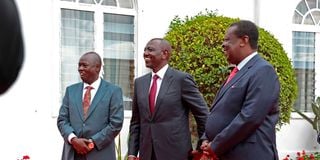Why appointments to Kenya’s diplomatic service require radical overhaul

President William Ruto (centre), Deputy President Rigathi Gachagua (left) and Prime Cabinet Secretary Musali Mudavadi at State House, Nairobi on July 12, 2023.
What you need to know:
- The diplomatic service has become a sandpit for experimentation.
- Many outstanding issues require pressing diplomatic intervention.
Appointments to Kenya’s diplomatic service have historically been conduits to give retired politicians something to do. Or, to provide a soft landing for politicians who lose elections but are loyal to the President.
The diplomatic service has become a sandpit for experimentation. A space to reward cronies and the highly connected with no regard for public service.
This has led to institutional loopholes in the foreign service, visionary deficiencies relating to advancing Kenyan foreign policy and a disconnection between the diaspora that these political appointees are supposed to serve, and the government of Kenya.
This is why appointments to Kenya’s diplomatic service require a radical overhaul.
Many outstanding issues require pressing diplomatic intervention. The diplomat requires years of soft diplomacy skills, academic and administrative training and a thorough understanding of the cultural and diplomatic infrastructure of the country to which they will serve.
This is not to say that persons who have never lived outside Kenya or have not been in the diplomatic corps cannot serve. It means that particularly to major diplomatic postings, in countries that are close partners of Kenya, the best and the brightest need to serve.
These are usually career diplomats with academic and institutional training in international relations. These postings do not suit political malcontents, cronies connected to rapacious cartels or political rejects who have lost elections.
Nominees to these positions require a good mix of experience in the diplomatic core, good people-to-people skills and a thorough grasp of Kenya’s foreign policy germane to the country of posting.
Key diplomatic postings
Recently, there appears to be a gap in the type of individuals nominated to these key diplomatic postings and the heavy demands and responsibilities of the stations to which these state officers are posted.
Diasporans want to see Kenyan diplomats sent abroad succeed. However, these appointees need to be job-ready. In most instances, they are not. Their academic and experiential training for diplomatic service remains woefully underwhelming.
Filling key diplomatic missions is also a matter of fairness and respect to career Kenyan diplomats that have taken years working through the rungs of the State Department bureaucratic maze, to earn postings at key missions. They have years of training and living experience abroad.
In addition to this, they have honed their soft skills which are key to negotiation in a divided and polarized world. There is no better substitute for experience. These bureaucrats add to institutional capacity and also leverage on people-to-people networks they have built over the years.
In addition to this, foreign partners gauge the seriousness of a country's foreign policy by the caliber of appointments to major international diplomatic centers.
Appointments to Kenya’s diplomatic service, therefore, requires a radical overhaul.
Mediocre diplomatic appointments to Kenyan embassies abroad have led to a plethora of increasing problems for diasporans. In the context of Kenyans in the US, certain issues remain unaddressed.
These include long delays in the issuance of passports and identity cards. Delays in passport and ID issuance cascade into challenges around documents for Kenyan citizens and/or their children born in the USA.
Leadership and competence
This continues to be an embarrassing crisis. Kenyans are forced to use only three centers in Washington DC, New York and Los Angeles. The distance from Los Angeles to New York or DC is almost the same as that from Accra Ghana to Nairobi Kenya.
The US is a transcontinental behemoth. More administrative centers need to be created to facilitate the ease of Kenyans getting these documents. Alternatively, technology should be used to make it easier for individuals to get these documents without having to travel to DC, New York of Los Angeles.
Solving this problem requires leadership, vision and competence. Much of which is lacking in many diplomatic appointments to the US and other major diplomatic centers.
Lastly, the question of the 40 per cent of Kenyans living undocumented in the US, most of whom are visa overstayers, needs to be addressed. Diplomatic appointees to the US should take this issue as a pressing concern. It has not been handled over the years.
The specific case of Mr Sylvester Owino, who spent over 10 years wallowing in the US deportation system, is a case in point. His case went all the way to the 9th Circuit Court of Appeals and is still not resolved.
With the potential of Mr Donald Trump coming to power, the plight of these undocumented Kenyans will get immeasurably worse.
There is an urgent need for diplomats who are knowledgeable, experienced and understanding of the myriad issues facing Kenyans. Diplomatic service is not a siesta. Nor is it a vocational jamboree in which to retire.
It is a posting of immense responsibility. A sacred calling. This is why, appointments to Kenya’s diplomatic service require a radical overhaul.
Professor Monda teaches political science, international relations, and foreign policy at the City University of New York. @dmonda1, davidmonda.com





